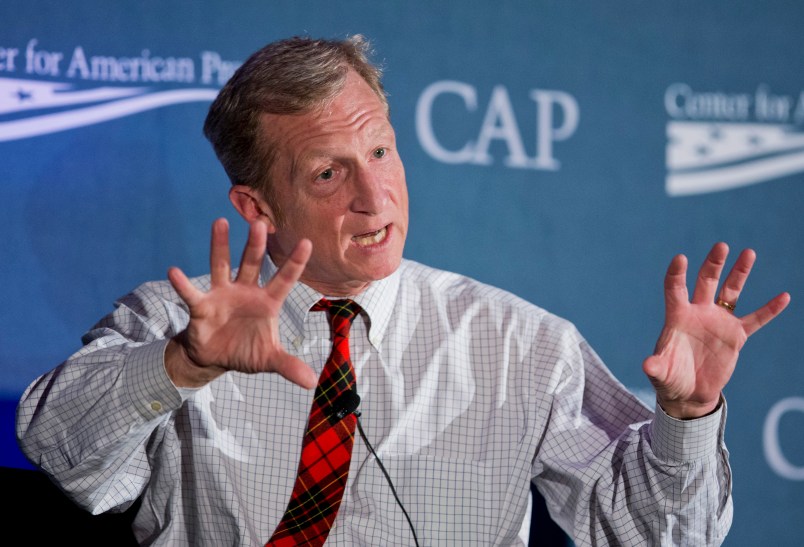Billionaire Tom Steyer announced on Thursday that he had decided not to run for Senate in California.
“Given the imperative of electing a Democratic president — along with my passion for our state — I believe my work right now should not be in our nation’s capital but here at home in California, and in states around the country where we can make a difference,” Steyer wrote in a post at The Huffington Post.
Steyer’s decision narrows the field slightly. Attorney General Kamala Harris (D) has already announced her candidacy for the seat, and Sens. Elizabeth Warren (D-MA) and Kirsten Gillibrand (D-NY) have signaled support for her. The Democratic Senatorial Campaign Committee also said that Harris was a strong candidate.
Steyer would have been a formidable candidate. His personal wealth would have been a particular boon in an expensive media market like California. He had already been active in politics as the founder of the NextGen Climate PAC which spent heavily in the 2014 midterm elections (with lackluster returns).
Steyer had been putting some of the groundwork in place toward a Senate run. Pollster Paul Maslin had conducted surveys of the field and a top aide to Steyer said that if he had decided, to run his campaign would have centered around environmental justice, education, and the economy.
Here’s Steyer’s full post:
Like all Americans, I care passionately about the American Dream — both the right to “life, liberty, and the pursuit of happiness,” and also the opportunity for our country to fulfill its promise: to do what’s right (whatever it takes) and lead the world. That’s the spirit that drove us from Yorktown to Omaha Beach to Selma. At our best, no one and nothing can stop us.
I ended my professional investing career because it conflicted with my growing concerns about our global warming crisis, and as I’ve worked full-time for better energy policies over the last few years, the connections between climate and other challenges we face have become glaringly clear. As my wife Kat often points out, the problems in climate and energy cannot be separated from the issues impacting the rest of world.
As I’ve long believed and as President Obama stressed again in his State of the Union speech on Tuesday, the global warming crisis — writ large — will define the success or failure of our generation.
At its heart, climate change is a justice issue. Some fossil fuel corporations, and the financial interests linked to them, benefit from the activities that contribute to this urgent crisis for our planet — but they are not the ones who pay the price. The costs are born by all the people; the rewards meted out to the select few. It’s not fair. And it’s not just.
And this contrast between the few and the many persists in two other “justices”: economic and educational. Economic inequality is the arrow shot at the heart of our democracy. As this imbalance is growing, the concept that our democracy is created of the people, by the people and for the people is threatened. Similarly, we need to know that if we work — and study — hard, we can move up. That’s the American Dream — and it depends on a quality education. And that’s not a reality for everyone today.
In short, to move forward, we need leadership in government and outside of government that is committed to environmental justice, economic justice, and education justice. Private enterprise — business — carries out the vast bulk of the work in our society, but government sets the rules. Those rules have to be fair and establish level playing fields so everyone gets a fair shake and we can make sure the market system can work efficiently. If powerful players tilt the table, it’s not right.
Since our wonderful Senator, Barbara Boxer, announced she would not run for re-election, I have given serious thought to what is the best way I can contribute to addressing these justice issues — environment, economic and education. Many people have generously shared their thoughts. My family and I have discussed the issue.
My decision about whether to engage from the outside or seek elected office came down to a single question: How best can I fight for a level playing field at this point?
This was a very hard decision. The U.S. Senate offers a unique opportunity to serve, but I also know that we will have excellent candidates. I applaud and respect those running, and am confident that Californians will choose a representative who will serve them well. Given the imperative of electing a Democratic president — along with my passion for our state — I believe my work right now should not be in our nation’s capital but here at home in California, and in states around the country where we can make a difference.
Going forward, I intend to redouble my efforts working with partners and fellow citizens to push for change. The road we take may be less traveled and less well-marked, but I am very determined. The journey is far from over — in fact, it has just begun.







Yes, there are good 1 percent folks. And there are bad 99 percent folks. Judge the person. This guy has big bucks and could say “screw everybody, I got mine”. Instead he wants to make a difference. Good man.
This makes it look like Kamala Harris will be our next Senator. I’m good with that.
That clears the way for Kamala Harris. Works for me.
I certainly understand his reasoning, but I like so much what he had to say I think it unfortunate he has decided not to run.